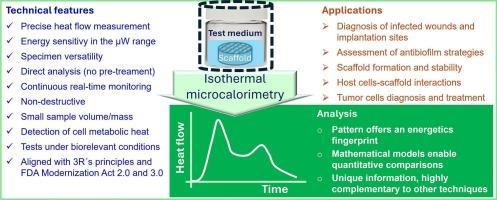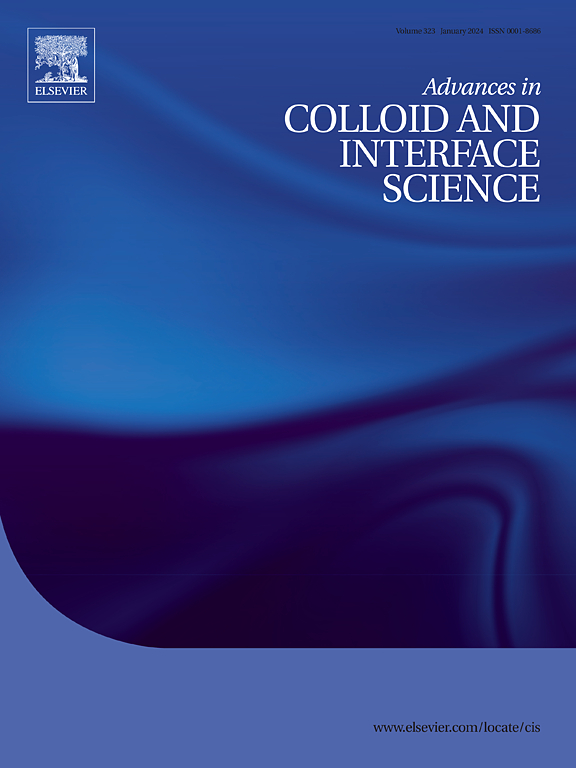Isothermal microcalorimetry for scaffold design and characterization: Assessing bacterial and host cell interactions and physicochemical stability
IF 19.3
1区 化学
Q1 CHEMISTRY, PHYSICAL
引用次数: 0
Abstract
Scaffolds used in regenerative medicine are increasingly expected to address personalization, bioactivity, and sustainability, underscoring the need for characterization methods that reliably predict safety and efficacy. Isothermal microcalorimetry (IMC) offers a highly sensitive, label-free, real-time measurement of heat flow from energy-generating or -consuming process at scaffold interfaces. By monitoring microbial activity, host cell metabolism, material stability, and responses to environmental or therapeutic factors, IMC provides physiologically relevant insight into scaffold performance over extended periods. Its non-destructive, low-preparation, and passive nature preserves samples for complementary analyses, making it a versatile yet underutilized tool in biomedical research. This review introduces IMC for scaffold design and characterization, emphasizing its capacity to evaluate vulnerability to biofilm formation and the effectiveness of anti-biofilm strategies. It further explores applications in tracking scaffold formation, assessing host cell-material interactions and tissue development, and probing the antitumor potential of engineered scaffolds. The review concludes with a perspective on IMC's role in advancing scaffold translation within the evolving regulatory landscape shaped by the FDA Modernization Acts 2.0 and 3.0.

等温微热法用于支架设计和表征:评估细菌和宿主细胞的相互作用和物理化学稳定性
人们越来越期望再生医学中使用的支架能够解决个性化、生物活性和可持续性问题,这强调了对可靠预测安全性和有效性的表征方法的需求。等温微热法(IMC)提供了一种高灵敏度、无标签、实时测量支架界面上能量产生或消耗过程的热流的方法。通过监测微生物活性、宿主细胞代谢、材料稳定性以及对环境或治疗因素的反应,IMC为长时间的支架性能提供了生理学相关的见解。它的非破坏性,低制备和被动的性质保留了样品的补充分析,使其成为生物医学研究中多功能但未充分利用的工具。本文介绍了IMC用于支架的设计和表征,强调了其评估生物膜形成脆弱性的能力和抗生物膜策略的有效性。它进一步探索了在跟踪支架形成,评估宿主细胞-物质相互作用和组织发育以及探测工程支架抗肿瘤潜力方面的应用。本综述总结了IMC在FDA现代化法案2.0和3.0形成的不断发展的监管环境中推进支架翻译的作用。
本文章由计算机程序翻译,如有差异,请以英文原文为准。
求助全文
约1分钟内获得全文
求助全文
来源期刊
CiteScore
28.50
自引率
2.60%
发文量
175
审稿时长
31 days
期刊介绍:
"Advances in Colloid and Interface Science" is an international journal that focuses on experimental and theoretical developments in interfacial and colloidal phenomena. The journal covers a wide range of disciplines including biology, chemistry, physics, and technology.
The journal accepts review articles on any topic within the scope of colloid and interface science. These articles should provide an in-depth analysis of the subject matter, offering a critical review of the current state of the field. The author's informed opinion on the topic should also be included. The manuscript should compare and contrast ideas found in the reviewed literature and address the limitations of these ideas.
Typically, the articles published in this journal are written by recognized experts in the field.

 求助内容:
求助内容: 应助结果提醒方式:
应助结果提醒方式:


